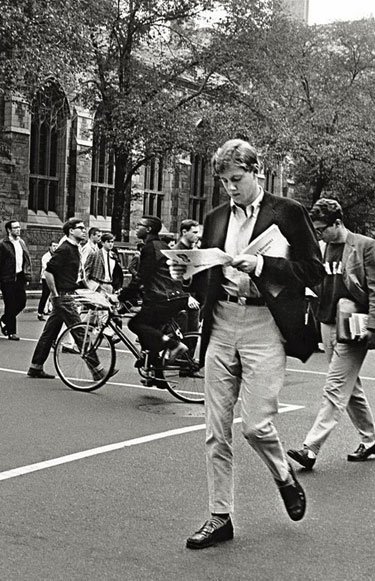
Today’s older meritocrats at college in the late 1960s.
David Brooks is dead wrong on the character of the ancien regime, falling like a sap for the fantasy stereotypes of the left-wing imagination. There were always plenty of ordinary middle class guys not rich at all, and even some poor, working-their-way-through-college fellows at Yale from humble backgrounds, long before the pedophile from Horace Mann took over Yale admissions, probably really back to the Class of 1705. But he is otherwise basically right this time. And the older Ivy League graduate would conspicuously differ from today’s “meritocrat” in, despite some higher education, recognizing that he, too, just like the working class chap living on the other side of town, still puts his trousers on one leg at a time, and in remaining aware that his automobile mechanic and his hunting guide are just as human as himself and may even be, in some departments, better men.
The older establishment won World War II and built the American Century. We, on the other hand, led to Donald Trump. The chief accomplishment of the current educated elite is that it has produced a bipartisan revolt against itself. …
The real problem with the modern meritocracy can be found in the ideology of meritocracy itself. Meritocracy is a system built on the maximization of individual talent, and that system unwittingly encourages several ruinous beliefs:
Exaggerated faith in intelligence. Today’s educated establishment is still basically selected on the basis of I.Q. High I.Q. correlates with career success but is not the crucial quality required for civic leadership. Many of the great failures of the last 50 years, from Vietnam to Watergate to the financial crisis, were caused by extremely intelligent people who didn’t care about the civic consequences of their actions.
Misplaced faith in autonomy. The meritocracy is based on the metaphor that life is a journey. On graduation days, members for the educated class give their young Dr. Seuss’ “Oh, the Places You’ll Go!†which shows a main character, “you,†who goes on a solitary, unencumbered journey through life toward success. If you build a society upon this metaphor you will wind up with a society high in narcissism and low in social connection. Life is not really an individual journey. Life is more like settling a sequence of villages. You help build a community at home, at work, in your town and then you go off and settle more villages.
Misplaced notion of the self. Instead of seeing the self as the seat of the soul, the meritocracy sees the self as a vessel of human capital, a series of talents to be cultivated and accomplishments to be celebrated. If you base a society on a conception of self that is about achievement, not character, you will wind up with a society that is demoralized; that puts little emphasis on the sorts of moral systems that create harmony within people, harmony between people and harmony between people and their ultimate purpose.
Inability to think institutionally. Previous elites poured themselves into institutions and were pretty good at maintaining existing institutions, like the U.S. Congress, and building new ones, like the postwar global order. The current generation sees institutions as things they pass through on the way to individual success. Some institutions, like Congress and the political parties, have decayed to the point of uselessness, while others, like corporations, lose their generational consciousness and become obsessed with the short term.
Misplaced idolization of diversity. The great achievement of the meritocracy is that it has widened opportunities to those who were formerly oppressed. But diversity is a midpoint, not an endpoint. Just as a mind has to be opened so that it can close on something, an organization has to be diverse so that different perspectives can serve some end. Diversity for its own sake, without a common telos, is infinitely centrifugal, and leads to social fragmentation.
The essential point is this: Those dimwitted, stuck up blue bloods in the old establishment had something we meritocrats lack — a civic consciousness, a sense that we live life embedded in community and nation, that we owe a debt to community and nation and that the essence of the admirable life is community before self.
If Brooks read his university alumni notes from earlier 20th Century classes over the years, he would have noticed how commonly “those dimwitted, stuck up blue bloods” enormously excelled in personal accomplishment, lifetime adventure, and public service just about all the grand meritocrats of our later generations.





Steve Gregg
The problem is that the Ivy Leagues produce smart people who are not intelligent. Smart people can process facts fast. Intelligent people can process facts correctly, because their values are correct.
It’s as if they took McNamara as their model, who knew operations research very well and applied it to everything, running the Vietnam War like a factory. Unfortunately for America, wars do not run like factories. The enemy does not surrender when the numbers say he should.
Likewise, the Ivy League geniuses are smart but are indoctrinated in values which do not work and have contempt for those not of their tribe. They are puzzled, deeply puzzled, why they are not respected.
Please Leave a Comment!